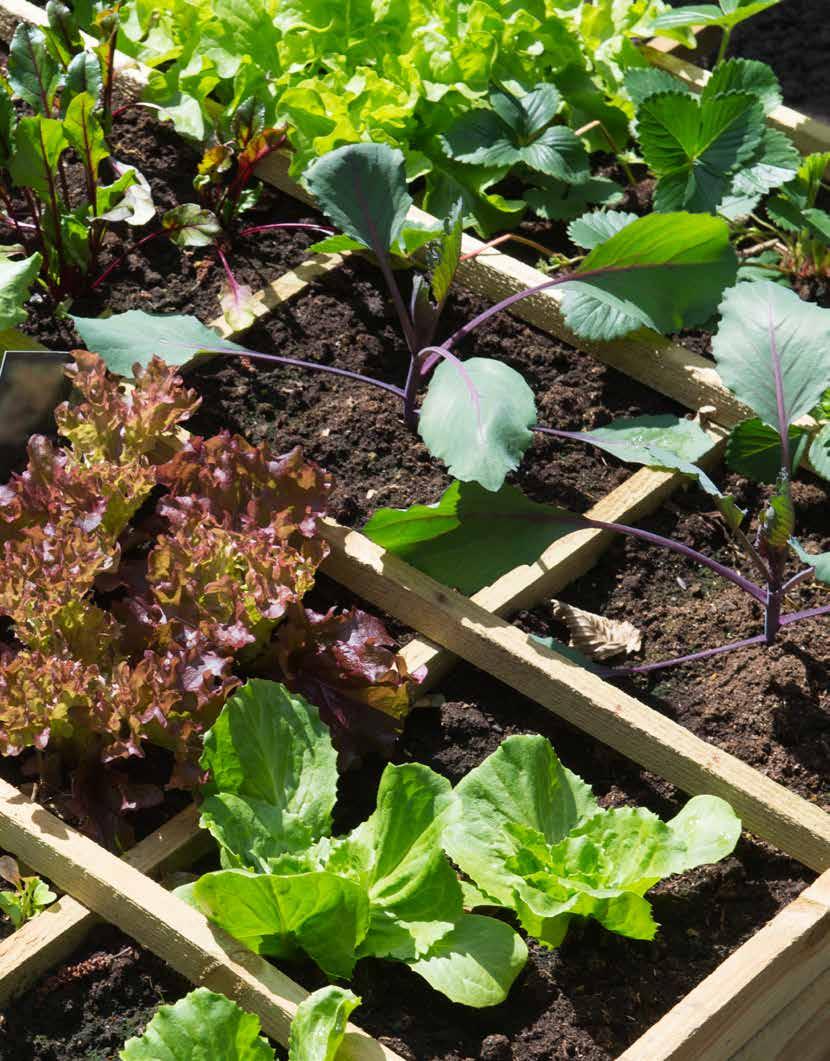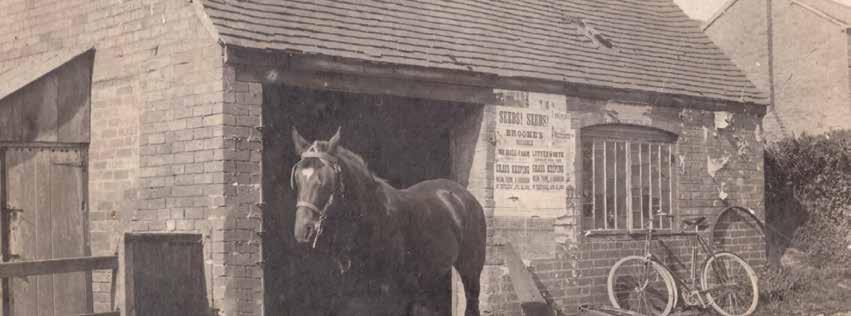
stays longer


stays longer
Plenty of new tv shows to keep you entertained this month
The weather can still be changeable, and it’s not summer yet, so in case you do have to crawl back to the sofa, on page 6 we look at some of the hottest TV coming this month, while if you fancy a trip to the silver screen, on page 13 we look at the biggest new movies out this month.
With us all getting outside a bit more,
Tackle
the big jobs now to reap the rewards later 8 Recipes from the freezer
14
month, the clocks finally change. With this comes an abundance of light in the evenings, and on pages 4&5 we look at some of the most exciting things to do with the longer days. And with the days of hibernating away on the sofa in front of Netflix coming to an end, on pages 2&3 we have our guide to the big spring clean.we have three fantastic features for you this month. The first is a guide to unique garden furniture which will set you apart from the rest, the second is all about spring fashion, how to stay warm yet not to warm, while being stylish at the same time, and the third is our usual monthly gardening guide.
To top this all off, we have an in-depth guide to Cheltenham Festival, and a whole host of top recipes to create from leftovers in your freezer!
So, grab a glass of vino, head to your favourite garden spot, and enjoy this month’s magazine.
Jonathan Wheatley Editor
It is a time of the year that equally excites and terrifies people up and down the country.
Spring is a fantastic time of the year when many of us will be filled with new-found inspiration and eagerness for a fresh beginning. Before you can look at new ventures in terms of relationships, work or self-benefit, consider taking part in the annual ‘big spring clean’ that many households complete annually. Booking out a day or weekend of your year to give your entire home a good scrub can be a fantastic way to have not only a sparkling house, but can also give our minds and souls an enormous boost. It is stated that completing cleaning tasks can produce endorphins, which drop stress levels, improve our ability to sleep and boost our overall mood. Here is a bumper guide to your big spring clean.
Having a fresh and clean bedroom to go to sleep in and wake up in every day can be a fantastic first step to help your home feel less cluttered and more tidy. Starting your day off right in a tidy and clean bedroom can give your mood a boost from the second you wake up. There are plenty of chores you can make sure you get done this spring in the bedroom. As the adage states, sometimes you have to make a mess in order to get tidy, so start by emptying any clothing drawers and wardrobes. Take this opportunity to clean down the inside of the drawers and doors as these are regularly missed during a routine clean. Before putting your clothes back away, have an organise and remove any clothing that no longer fits, is damaged or you will not wear again. If you haven’t worn a piece of clothing in the last year, then you are unlikely

to need it in the future. You could pack away thick winter clothing and rotate this with your thinner and sunfriendly clothing ready for the warmer months ahead. Now, you can flip your mattress, change the bedding, and dust down light fittings and ceiling fans. Wipe down any door knobs and light switches and wash window sills and skirting boards, before using the vacuum and shampooing carpet or mopping hard floors.
The main living areas of our home are typically the spaces we like to keep clean the most, therefore are more likely to keep on top of throughout the year, however there are some odd jobs which you may have forgotten. Always start your clean by fully opening the windows, to get the air circulating around the room. If you have curtains, take them down and put them on a wash - typically a gentle cycle using cool or lukewarm water is recommended. Give ceiling fans and other light fittings a good dust, before vacuuming down sofas and chairs, including removing the cushions and doing this underneath. Lamps, shades, furniture and shelves should all be given a good clean, while television systems and wires should be removed, untangled and fully dusted behind. Vacuum throughout the room and shampoo carpets, if applicable.



Another room where hygiene and cleaning is important throughout the year is the kitchen. This is prominent as many of our homes these days centre around the kitchen, as it is a great space to entertain guests. For your kitchen’s spring clean, consider emptying your drawers and cupboards, wiping down fully before placing items and food back in, organising and removing clutter throughout. The outside doors, knobs and light switches need to be cleaned down. Ovens and stoves can get dirty as each of us use them most days, so spend a decent amount of time cleaning these. Next, clean down any countertop appliance you may have, including kettles, toasters, microwaves, air fryers and coffee machines. Have a root through your freezer and remove any foods you will not use and plan out some meals to use up frozen meat and vegetables. Clean out your larger appliances, such as dishwashers and laundry units, including removing lint traps, cleaning the inside of doors and the compartments for tablets and liquid. If you can, pull out any appliances and give the floor behind a good scrub.
There are also plenty of jobs that should be done in the bathrooms of your home. Empty and wipe down any cabinets you have. This is also a great time to organise shampoos, conditioners and the various lotions and potions you have collected, before putting them back away. Wipe down mirrors and their frames, while also sanitising your sink. Clean and drain the bathtub, scrub both the inside and outside of the toilet, including the hinges and bolt covers. Sweep and mop the flooring and consider adding extra seal to any grout lines if needed.




As we welcome in March, we can happily say that spring is right around the corner. The winter weather is finally giving way to warmer winds, greener trees and brighter evenings. It really does represent a turning point in our country, as we step out of the cosy yet dreary winter and into longer, sunnier days. We consider spring to be a time for optimism and new—or revisited—beginnings. There is plenty to look forward to in this next stage of our calendar year, starting the moment we put our clocks forward on 26th March at 1am. Here are just a few of the reasons we’re excited for it!

One of our favourite things about entering British Summer Time is the extra sunlight we receive in the evenings. There’s no better time than the early evening on a sunny day, when the golden hour can be observed in full. Seeing leaves, fields and even built areas draped in golden sunlight is very motivating for us—it provides the perfect conditions for exercising in the evening! If you haven’t tried running in the evenings at this time of year, we highly recommend it. Unless it’s been a real scorcher of a day, the temperature tends to dip just a little bit around 5 –6pm, allowing for a really comfortable run. If your exercise routine has suffered over the autumn and winter period, this month would be a great time to start it back up again. There should even be some organised runs and races popping up in the evenings over the next few months, which are both great motivation and a lot of fun—plus they make you appreciate dinner even more!

This means we will feel much happier leaving the house to attend local events like gigs and shows, or even to visit family members who live further away.

Let’s expand upon the point about exercise and celebrate all the other activities we can now do with an extra hour of sunlight! It’ll soon be the case that even those of us who finish work late will be able to enjoy some daylight hours. This means we will feel much happier leaving the house to attend local events like gigs and shows, or even to visit family members who live further away. What’s more, it has been proven that entering British Summer Time has a greatly positive effect on our kids’ activity levels. During Daylight Saving, it’s often already getting dark by the time they leave school, which leaves no opportunity for them to safely meet up with friends to play or hang out. Now, however, they’ll be able to spend a lot of time after school with friends, which will directly or indirectly increase the amount of exercise they do.




Seasonal Affective Disorder (SAD) is a very prominent issue in our society, yet not many people are aware of it or acknowledge it in themselves. SAD affects our mental health, and causes significant dips in mood at certain times in the year. This can happen at any time, depending on the person, however winter is the most common time of year for people to experience the deep depressive periods. The popular theory behind this is due to the absence of daylight in the mornings and evenings—especially for those who work traditional hours. Exposure to natural daylight has been concretely linked to mental health, so to put it loosely darker days equals lower moods. Luckily, this season is almost over, and we can start looking forward to brighter mornings and evenings. Alongside the mental health benefits of sunlight, we often feel encouraged to get out of bed earlier, which always helps to make days feel productive—except the first day of BST of course, because we really do miss that hour of sleep!
Depending on how the weather treats us we might be jumping the gun on this one, but we’re sure there’s going to be at least a few days soon where we can bring mealtimes outside. There’s no better way to spend a warm evening than serving up a lot of different dishes and letting your family load their plates while sitting at your garden table. Just make sure to keep anything you want to be warm in the kitchen still—we can’t fully trust British spring to stay warm all night. If you’ve never tried dining outside, we highly recommend it! It is a surprisingly tranquil experience, with the sounds of the world offering a lovely backdrop to a delicious meal.


After what feels like an absolute age, despite it only being a few months, it is nearly the time of the year when we can regularly spend time in our gardens again. With days slowly getting longer and the weather drying up, garden and nature lovers will be buoyed to know summer is just around the corner. Now is the ideal time to start thinking about any potential changes you may want to make to your garden ahead of family barbecues and outdoor gatherings. One feature you may consider changing, upgrading or adding to is your selection of garden furniture. Here are a few unique pieces of furniture you could decide to invest in this year.
Both seating and surrounding tables are an important feature for most gardens to provide guests with somewhere to sit and enjoy gatherings. A slightly different choice you could plunge for is a specially designed outdoor breakfast bar. These offer a higher platform to sit and can easily tuck away in a garage or shed to avoid cluttering your outdoor space, whilst still offering a great place to enjoy a burger, or two.
A blissful afternoon spent in the sun swinging on a hammock may seem to many like a cartoon dream, however this could be within reach. Even if you do not have two trees close enough together to balance a hammock between, there are plenty of outdoor specialists who sell hammocks with frames. Picture yourself grabbing a book and a glass of prosecco ready for a relaxing day in your garden swinging on a hammock as you enjoy a gentle breeze.
Another seating solution, which will certainly stamp your mark and authority on your garden, is to purchase some personalised deckchairs. There are multiple online stores which offer customised furniture, including deckchairs. These are easy to move, can comfortably be placed on grass or hard surfaces and if they display your name, can add a bit of Hollywood glamour to your garden.
There is plenty of great television to enjoy at the moment, and its popularity is only going to increase.
Staying at home rather than going to the cinema has become a trend of sorts, and boxsets and drama show streaming still dominates the entertainment industry tenfold compared to how it used to fair in the late nineties / early noughties. Here are our picks for the best upcoming TV shows to enjoy.

The cornerstone of the Star Wars TV universe, Disney+ launched with The Mandalorian as its main Star Wars content almost three years ago. The show’s popularity has only gotten better, and is now launching spinoffs and follow-ups ranging from The Book of Boba Fett to Ahsoka. The Mandalorian, however, continues to produce great quality TV for fans, with its third season being aired on March 1st on Disney+. Taking place five years after the events of Return of the Jedi and set amidst the fall of the Galactic Empire, The Mandalorian follows a lone bounty hunter in the outer reaches of the galaxy, who is hired by remnant Imperial forces to retrieve the child Grogu, but instead goes on the run to protect the infant. Season 4 four of the show is in production.
An upcoming American streaming television miniseries, based on the book of the same name, Daisy Jones and the Six follows a 1970s rock band from their rise in the LA music scene to becoming one of the most legendary bands in the world. The show explores how and why the band split when they are at the peak of their career. The idea came to author Taylor Jenkins Reid due to being inspired by her experience growing up and by watching Fleetwood Mac performances on television. The show is set to consist of ten episodes with the story being presented in a documentary style, including background interviews with the band. It is set to premiere on Amazon Prime Video on March 3rd.
The second part of the fourth season of the hit Netflix show, You, is arriving on our home screens this month. There has been a month’s gap between the two split halves of the season, with the second part of season four scheduled for release on March 9th. You follows the journey of a dangerously charming, intensely obsessive young man who goes to extreme measures to insert himself into the lives of those he is transfixed by.
If you are doing a big spring clean this year and have started tackling your kitchen, you may find lots of ingredients in your freezer which you have no idea how to use up.

Many of us fall into the trap of realising meat or other food items are about to run past their ‘use by’ date, so throw them into the freezer, never to be seen again.
However, this can be a fantastic source of ingredients for mouth-watering meals, which is particularly useful when the pursestrings are feeling a tad tight.
It is important to remember how long certain meats can be kept in the freezer, to
avoid any health implications. According to the Government’s food safety group, these are the lengths of time different raw meats can be frozen safely for
Bacon - one month
Sausages - one to two months
Burgers - three to four months
Steaks and chops - four to 12 months
Whole chicken or turkey - one year
Chicken or turkey pieces - nine months
Fatty fish - two to three months
Lean fish - six to eight months
Here are a few recipes you could sample in order to use up some of the frozen produce you may come across in your freezer.
INGREDIENTS
1l hot vegetable stock
400g tinned chopped tomatoes
100g thin spaghetti
350g frozen mixed vegetables
This very quick and easy to make minestrone soup is a fantastic way to use up any frozen vegetables you may find in your freezer.
4 tbsp pesto
Olive oil
Start by bringing the stock to a boil with the tomatoes, then add the spaghetti and leave to cook for roughly six minutes. Just before the pasta is ready, add your mix of vegetables. Leave the whole pan to simmer for two minutes.

Serve this in bowls drizzled with pesto and oil for flavour and sprinkle over some parmesan cheese if you wish.
You can also portion any leftover soup and freeze for up to three months, for an easy and simple lunch idea.

SERVINGS 4 PREP 10 mins COOKING 20 mins
INGREDIENTS
250g frozen white fish
1 lime
1 tsp ground turmeric
3 tbsp vegetable oil

1 large onion
1 tbsp ginger
3 garlic cloves
2 tsp ground cumin
2 tsp ground coriander
1 tsp chilli flakes
2 tbsp tomato puree
250g diced butternut squash
200ml coconut milk
2 tbsp tamarind paste
Small bunch of coriander
Cooked rice
Here is a mouth-watering and simple way to use up some frozen white fish. This recipe uses multiple ingredients which are freezable, as well as a number of spices, meaning you may already have the ingredients in your kitchen, just waiting to be put together.
DIRECTIONS
Tip the fish into a large bowl and add ½ of salt and plenty of black pepper, half the lime juice and turmeric, before stirring and setting aside.
Heat a frying pan with oil and cook the onion until soft. Add the ginger, garlic, salt, spices and remaining turmeric and cook for two minutes. Stir in the tomato puree and cook for a minute. Tip the butternut squash and sweet potato mix into a heatproof bowl with a splash of water, before covering and microwaving for three minutes. Add the mix into the pan and stir to combine.
Add the coconut milk, 180ml of water, the tamarind paste, salt, black pepper and leave this to simmer for up to 12 minutes until thick. Add the fish into the sauce and cook for six minutes until the fish appears opaque. Break the fish up and stir in the remaining juice before serving with rice.
Gardening in the UK in March can be a bit of a mixed bag, as the weather can be unpredictable and vary greatly from region to region. However, with a bit of preparation and the right approach, you can make the most of this transitional time in the gardening calendar.

One of the biggest tasks in March is pruning shrubs and trees. As winter ends and spring approaches, now is a good time to cut back any damaged or diseased branches, as well as any old woody growth to encourage healthy new growth. This applies to deciduous shrubs, such as dogwoods, as well as evergreens, such as box and yew.
It’s also a good time to get started on preparing your soil for planting. March is a great time to add compost and well-rotted manure to your beds, as this will give your plants the best possible start. Use a garden fork to gently turn over the soil and work in the organic matter, taking care not to compact it. This will also help to warm up the soil and make it easier for you to plant in April.
If you’re planning on planting new
shrubs or trees, March is the perfect time to get started. Make sure you choose the right plants for your garden’s soil type, light levels, and climate, and make sure you prepare the soil properly before planting. Give your new arrivals a good watering in, and make sure you keep them well watered throughout the first growing season.
March is also a good time to start planting your vegetable patch, if you haven’t already. If you’re starting from scratch, choose a sunny spot and make sure your soil is well prepared. If you’re planting in containers, make sure you choose good-quality compost, and make sure your containers are big enough for your plants to grow into.
This month is also a good time to start planting your annuals and perennials, if you haven’t already. Start by choosing the right plants for your garden’s soil type, light levels, and climate, and make sure you prepare the soil properly before planting. If you’re planting in containers, make sure you choose good-quality compost, and make sure your containers are big enough for your plants to grow into.
With a bit of care and attention, your garden will soon be full of life and colour, and you’ll be well on your way to a successful growing season. Whether you’re an experienced gardener or just starting out, March is the perfect time to get your hands dirty and start planting.
In terms of maintaining your garden, March is a good time to start weeding. Weeds can quickly get out of control, so it’s important to tackle them as soon as you see them. Use a hoe or a hand fork to gently remove the weeds, taking care not to damage any of your other plants. Make sure you remove the weeds from the root, so they don’t come back.



Finally, March is a good time to start mulching your beds. Mulching helps to suppress weeds, conserve moisture, and regulate soil temperature. Choose a good-quality mulch, such as bark chips or compost, and spread a layer 2-3 inches deep over your beds. Make sure you don’t spread it too thickly, as this can smother your plants and cause them to rot.
In conclusion, gardening in the UK in March can be a bit of a challenge, but with the right preparation and approach, it can be a rewarding and enjoyable experience. Whether you’re planting new shrubs or trees, preparing your vegetable patch, or simply maintaining your garden, March is the perfect time to get started. Happy gardening!
Release your summer wardrobe as the warmer weather finally arrives
As the weather, becomes ever warmer so do our preferences in what to wear. No longer do we need to be engulfed with thick warmers. You can still be light with your threads, yet at the same time stay nicely insulated. Here is our style guide to provide some inspiration for how best dress for the spring weeks
TIE-DYE TOPS
Can have pretty much any design, and bright colours can lift spirits on a sky which wants to be sunny but can’t quite shine as bright as your mood.
JUMPERS AND CARDIGANS
Are fantastic for this kind of weather and temperature, ideally with no shirt underneath for added comfort. Depending on temperatures, off-the-shoulder cardigans can be particularly stylish. Knit Co-Ords are all-in-one outfits which are typically airy yet don’t expose too much skin, ideal for a light, mild day.
DRESSES
Come in all kinds of materials and will be comfortable, especially for long walks since it will keep you ventilated. White shirt dresses are a great stylish alternative, since they look especially smart and have a fresh feel to them.

SUIT JACKETS
Highly versatile and can really make a fashion statement. They go great with jeans, but are equally smart with chinos or khakis.
DENIM SKIRTS
Both attractive and comfortable during the slightly warmer weeks. Corduroys will guarantee comfort, whilst allowing you to remain quirky and interesting.
GOLF POLOS
Perhaps the epitome of smart casual shirts, and are surprisingly versatile for any kind of function, not just golf events.
FLEECE ZIP-UPS
Give you that flexibility of allowing for ventilation if needed, but also retain that tight fit which can provide much appreciated insulation.
V-NECK SWEATERS
Go perfectly with ties, for if you’re attending a smart casual function, but even just out and about they can be very comfortable especially if they are thin and slim fit.
TURTLENECKS
Have been around for a while but are still very much in fashion, and they go brilliantly with gillets.
GILLETS
Come in all shapes, styles and sizes, and for spring a thinnerstyled gillet could be a wonderful addition to your going-out threads.
TACTICAL TROUSERS
Usually thin and airy, and usually with numerous zipped pockets, so they are absolutely ideal for if you’re out and about.
The cinema still shines as one of the best ways to enjoy blockbuster films, especially upon release
Adonis Creed is till dominating the boxing universe, and is thriving in his career and family life. However, when Damian, a childhood friend and former boxing prodigy, resurfaces after serving time in prison, Adonis is tempted by an offer he can’t refuse. The face-off between former friends is more than just a fight, it is a war for which Adonis must put his future on the line. Damian, however, has nothing to lose. Creed III will be released in UK cinemas on March 3rd.
The sixth official entry into the critically acclaimed satire horror slasher film series brings the Ghostface killer to New York City, where they hunt Jenna Ortega’s Tara and Melissa Barrera’s Sam Carpenter, after the survivors attempt to leave Woodsboro behind for a fresh start. The previous instalment in the franchise was, although billed as a relaunch of the series, a direct sequel to Scream 4, meaning Scream VI will simply continue the narrative, making it a sequel to Scream 5, aka Scream (2020). Scream VI is set for release in UK cinemas on March 10th.
The long-awaited sequel 2019 DCEU film Shazam! will revolve around foster kid Billy Batson (played by Asher Angel) who gains the ability to transform into a superhero, played by Zachary Levi, each and every time he says the word Shazam. The first film saw Batson having fun while testing out his newfound powers, but in the sequel we are expected to see the character undergo some maturity in using his powers. Shazam! Fury of the Gods is set for release in UK cinemas on March 17th.
JOHN WICK: CHAPTER 4
John Wick has a price on his head, and it’s everincreasing. In this third sequel, Wick takes his fight against the High Table global as he seeks out the most powerful players in the underworld, from New York to Paris to Japan to Berlin. Without a single disappointing entry in the series thus far, fans can expect another awesome ride. John Wick: Chapter 4 is due to be released into UK cinemas on March 24th.
Movie sequels aren’t just craved by fans, they are also increasing in quality as more and more of them are being made. Some of the best films ever produced are sequels, and although they are, by definition, fundamentally inferior in originality when pitted against their predecessor(s), films like Avengers: Endgame and Star Wars: The Force Awakens still feature in the top four highest grossing films of all time. So, here are our top picks of upcoming sequels to enjoy.

f you’re a keen follower of the UK’s equestrian scene, you’ll already be well aware of the excitement that’s just around the corner. March welcomes the Cheltenham Festival, one of the most noteworthy gatherings in the Great Hunt racing calendar. It’s known for having an unbeatable atmosphere, with the crowd’s Cheltenham Roar becoming a thing of legend. There’s an argument to be made for Cheltenham being the second biggest horse racing event we have—in terms of prize money, only the Grand National is more significant!
Last year’s Cheltenham Festival was ground breaking in many ways. First of all, the total attendance across all four days was the highest in the festival’s history, with 280,627 horse racing fans gathering to witness the action. What’s more, we also saw the monumental achievement of Rachael Blackmore, who became the first female jockey to win the prestigious Gold Cup. (This came after making history with her Grand National win in 2021.) We’re looking forward to this year’s festival, and hoping that we see similarly huge turnouts and great moments. Here’s a little more about the history of the Cheltenham Festival, and some guidance for this year’s festivities, so that both seasoned viewers and budding racing enthusiasts can get stuck in!
The Cheltenham Festival was started in 1860, but it has not always been the event we know and love today. Originally, the event was called the Grand National Hunt Meeting, and the first iteration was run in Market Harborough. Since then, its location frequently changed, with most Meetings being held at Warwick Racecourse. However, thanks to significant investment in the infrastructure of the racecourses at Prestbury Park, the Meeting was moved permanently to Cheltenham starting in 1911. It is unclear when the name of the event was officially changed.
As we mentioned previously, the Gold Cup is the most prestigious prize to be won at Cheltenham. It was created in 1924 with the purpose of being a supporting race for the County Hurdle, but over time it became more highly regarded, eventually becoming the most highly anticipated race of the event. The Stayers’ Hurdle, however, is the oldest existing race to have championship status, having first been run in 1912.
In 2005, the Cheltenham Festival began to span four days, doubling the original duration. It now features a total of 28 races—7 on each day— with at least one championship race per day.


Let’s now take a look at the order of events for the 2023 Cheltenham Festival. In the interest of space we will only cover the championship races, but we highly recommend tuning in to watch the others too! Championship races are the pinnacle of prestige at Cheltenham, attracting the best competitors and highest prize pots. In official terms, they are ‘Grade 1’—the highest calibre of jumps race you can get. Each day’s main event will be highlighted.
Day 1: Champion Day
1:30pm Supreme Novices’ Hurdle Race
2:10pm Arkle Challenge Trophy
3:30pm Champion Hurdle
4:10pm Close Brothers Mares’ Hurdle Race


Day 2: Festival Wednesday (Ladies Day)
1:30pm Ballymore Novices’ Hurdle Race
2:10pm Brown Advisory Novices’ Chase 3:30pm Queen Mother Champion Chase 5:30pm Champion Bumper
If you’re not attending the Festival, don’t worry! You’ll be able to watch most of the important races on ITV, which continues to build its reputation as the home of racing in Britain. Not all races will be televised, however, so make sure you check for yourself to avoid disappointment.
Let’s look at some noteworthy names and favourites that will be competing at this year’s Cheltenham Festival.
First up, Facile Vega is a very prominent horse that is booked to win the Supreme Novices’ Hurdle, after already winning the Champion Bumper last year. Some say he is yet to reach his full potential, however, so there’s a chance it doesn’t play out as planned.
Next, the star of last year’s Festival is back. Constitution Hill will be running the Champion Hurdle on Tuesday, and is set to continue his unbeaten streak with another statement victory.
Finally, we have the reigning champion defend his title in the Queen Mother Champion Chase on Wednesday. Energumene will have some tougher competition this time around, but experts are still convinced he is the horse that will lead the pack.
2:50pm Albert Bartlett Novices’ Hurdle 3:30pm Cheltenham Gold Cup
Our Thoughts – A Stylish barn conversion, which was the original show home and occupies the best position and plot (circa .33 of an acre with over 2,200 sq ft of living space). As well as being sympathetic to the features, charm and character of the original building, the property boasts modern comforts with a twist of contemporary style. Converted by local experts “Bilton Design & Build”, the building (dating back to 1880), is part of a Victorian model set of barns, the property offers a generous garden and is heated via gas under floor heating to the ground floor and radiators to the first floor. Viewing is advised to appreciate the large living room, which is perfect for entertaining and the interesting period features that are peppered throughout.





Set in the popular village of Harborough Magna, this spacious detached property boasts a double garage, large driveway, and garden to front, rear and sides. The kitchen/breakfast room has been tastefully re-fitted with modern units, quartz work-surfaces and integral appliances. There is a spacious lounge with bow window and large inglenook fireplace with wood-burning stove, a generous dining room/reception room and sun room opening onto the patio area. Upstairs four well-proportioned bedrooms will not disappoint; the master has a balcony with views over the countryside and en-suite. There’s also a main bathroom and separate WC. The property utilises solar energy to make it not only energy efficient but economical to run.








6 Albert Street, Rugby CV21 2RS


01788 560 905
Set in the heart of the village, this property enjoys a private garden and plot to three sides. With four well proportioned bedrooms, a lounge, dining room and large study/ground floor bedroom, this versatile property also offers a stylish bathroom to the ground floor and shower-room upstairs. There is a larger than average garage, driveway for 2-3 cars and much more.
In conjunction with “Revel Homes” we are proud to present this selection of stylish, village homes with countryside views to the rear. A member of the “Federation of Master Builders”, “Revel Homes” specialise in rural and semi-rural build projects with a focus on sympathetic exterior design, high specification fittings and well-proportioned accommodation. There are four detached properties available, all with mains gas central heating, four double bedrooms, two en-suites and high specification kitchen/diners that have views over the garden. The properties also boast generous lounges, as well as a utility room and WC to the ground floor. Upstairs there are three double bedrooms (one with en-suite) and a bathroom to the first floor and a stunning master bedroom on the second floor also boasting an en-suite.
Honeypot Lane, Husbands Bosworth Asking Price £475,000 Lutterworth, Pailton Asking Price £475,000An unusual opportunity to purchase a freehold (title to be split) investment/development opportunity, which is currently part of a hotel. With eight bedrooms (four doubles, four singles), all with either en-suite bathrooms or shower-rooms, the property is currently heated via a communal gas boiler and will have it’s own electricity metre. The single rooms are circa £55 per night and the doubles £65, however the room could benefit from refurbishment and with concentrated marketing could achieve more. The property could also been converted into an HMO, or apartments. There is the potential to negotiate with the owner about parking spaces on a purchased or permit basis. Positioned close to the town centre and railway station/bus station, this could be a lucrative investment for a seasoned investor. No chain.










 Norton Leys, Hillside, Rugby Asking Price £340,000
A large, detached property boasting a spacious living room, study/play room, WC and kitchen/dining room to the ground floor as well as four bedrooms and a modern shower-room to the first floor. To the front there is a well-proportioned lawned garden and a long driveway that leads to the side of the property and provides parking for numerous cars. There is also a large single garage. The rear garden is also a generous size and offers a patio seating area and large lawn. No upper chai
Norton Leys, Hillside, Rugby Asking Price £340,000
A large, detached property boasting a spacious living room, study/play room, WC and kitchen/dining room to the ground floor as well as four bedrooms and a modern shower-room to the first floor. To the front there is a well-proportioned lawned garden and a long driveway that leads to the side of the property and provides parking for numerous cars. There is also a large single garage. The rear garden is also a generous size and offers a patio seating area and large lawn. No upper chai
Cadman Homes Estate & Letting Agents

6 Albert Street, Rugby CV21 2RS
01788 560 905
Asking Price £325,000










Extended to provide a ground floor bedroom/extra reception room and a shower room, this property offers three first floor bedrooms and bathroom, as well as a kitchen/diner and lounge to the ground floor. There is a conservatory, driveway for 2-3 cars and the property could be sold with no chain.
For sale with no chain this grand period property is in need of modernisation but boasts versatile accommodation, in a pretty South Leicestershire village. The property could be sub divided, having direct access from the roads to the front and rear with the Lutterworth Rd entrance having a pretty garden, with views over the church and churchyard. With a dual aspect lounge and dual aspect kitchen/diner, three first floor bedrooms, two second floor bedrooms, and outbuilding and cellar.
Norton Leys, Hillside Lutterworth Road, Bitteswell Asking Price £300,000A well presented and improved modern property within a popular village. Boasting a modern kitchen with appliances, a generously proportioned lounge/diner and conservatory with under floor heating. With two bedrooms (the master with extensive built in wardrobes), a modern bathroom and storage cupboard upstairs, this property would make a great first time buy, or suit those looking to downsize but stay in a village location. The rear garden leads to a parking bay to the rear. There are also visitors’ bays for additional parking. Sold with no chain this property has modern PVCu double glazing and central heating to radiators via an electric boiler. Energy Rating - D







 Tennant Close, Hillmorton Asking Price £200,000
Set in a quiet cul-de-sac off of Stanley Road this detached one bedroom bungalow is modern, low maintenance and boasts a driveway and well-proportioned rear garden. With a lounge/diner, kitchen, double bedroom and wet room/shower room, this property is also sold with no upper chain.
Tennant Close, Hillmorton Asking Price £200,000
Set in a quiet cul-de-sac off of Stanley Road this detached one bedroom bungalow is modern, low maintenance and boasts a driveway and well-proportioned rear garden. With a lounge/diner, kitchen, double bedroom and wet room/shower room, this property is also sold with no upper chain.

Valerie brings to the table over thirty years of experience and knowledge, gained from working for some of the country’s most respected agents. Positions have included managing Knight Frank’s prestigious Birmingham City office and being responsible for the growth and successes of some of Warwickshire’s most well-known agents, winning the National “Best Letting Agent” award in both 2004 and 2006 for one local agent.With a genuine passion for the industry, Cadman Homes was set up to offer an unrivalled, professional cutting edge service, with a personal guarantee that everyone that comes into contact with the company will enjoy the “red carpet treatment”.To be the very best you have to have the best team, so it’s important to have a team that you can trust and Valerie had to look no further than her husband Adam, and her sons Damian & Mathew.

Adam has been marketing and selling homes for over 15 years across Warwickshire, Northamptonshire, Oxfordshire, Coventry and Birmingham. Well respected within the industry, Adam has a reputation for proactive, forward thinking estate agency and going the extra mile for his clients. Adam is perfectly placed to advise you about the correct pricing, and proper marketing of your property – never forgetting that your property is an investment that needs handling as such. Adam is part of a voluntary group of local businesses called “Love Rugby Town” who organise events locally to showcase businesses in Rugby. He is past chair of the Rugby (Webb Ellis) Chapter of BNI and Rugby Round Table (113 area 45). Adam is a keen Rugby fan (the game and the town) and has always supported Northampton Saints. His hobbies include shooting and cooking, and takes many pictures of his creations to tempt and tease the staff with! Adam has appeared on “Homes under the hammer” and “To buy or not to buy” and has a (not so secret) desire to be on TV as a presenter! or the next James Bond.

Mathew is an experienced letting agent with experience in Rugby, Coventry and Leicestershire. He excels in providing an honest “Plain English” approach when dealing with clients, walking them through what can be a difficult time, always thinking of the client and how he can help them. Mathew has over 12 years’ experience in residential lettings and property management, working for some of the biggest and best names before joining the family firm. Mathew enjoys spending his spare time with his wife, three children and dog. If he has any time leftover he is an avid Manchester United fan and tries to watch them play whenever he can.


Damian is a practicing solicitor who qualified in 2006. Damian works in house as our Head of Compliance and Legal Advisor. He has worked for various prestigious firms throughout his career including a top 40 national law firm. Having won regional national awards for contribution to the commercial business line, he was also nominated for the Leicester Law Society Solicitor of the Year. Damian has an extensive experience of litigation, and also deals with all matters concerning property including but not limited to; possession proceedings, rent valuation tribunals, landlord and tenant law, boundary disputes and rights of way issues. Damian is also a founder of Legs 4 Africa, a charity that take redundant prosthetics and walking equipment from the UK to teaching hospitals in Africa. It is Cadman Homes’ preferred charity and the company actively supports the charity both financially, and by raising funds and awareness of fundraising events.
Mathew Cadman-JonesIf you are looking to sell your house, or have had your home on the market for a while now, then you probably want to get the maximum sale price in the quickest time. There are a few things you can’t control – but the one thing that is in your control, is the look and feel of the interior and exterior.

While it’s worth spending time fixing and cleaning your house before potential buyers come and view, it’s also important to de-clutter. This creates spacious rooms and also allows you to decrease and organise your personal items before you move yourself. Of course it’s understandable that you don’t to want spend money, time and energy on a home you are about to leave, however, a lot of people are looking for a house in which they can move straight into. Maintaining your
property might even save you thousands of pounds; it could even reduce added expenses of living in your home whilst waiting for a sale. And it might even help avoid possible reductions in the asking price.
The main reason in which people move house tends to be because they lack space in their current home. They want a home that is spacious and in which they can grow into. If a potential viewer comes to your home and sees that there is lack of space, then this will turn them away.
De-cluttering allows you to remove any unnecessary items in an untidy or overcrowded place. It will help maximise your space, emotionally prepare you to move, and will allow you to focus your buyers on what is important.
Maximise your home’s potential and create spacious rooms enticing potential buyers – simply by de-cluttering!
De-cluttering allows you to… maximise your space, emotionally prepare you to move, and will allow you to focus your buyers on what is important
You need to create a great first impression and focus on the rooms themselves. You will notice that the first things you see in each room are personal items. Where possible you want to create the look of a
them into things you want to keep and things you want to get rid of. You may even find that you have collected a cupboard full of paper work. Get yourself organised! Don’t just throw it all away, but file it and go through it thoroughly. This will also make it easier when you move.
De-personalising can also be a great way to declutter. Too many personal effects can be distracting to buyers. They want to see a house in which they can make their own memories rather than seeing yours. Again, personal items can be stored away. Remember
If you are throwing away paperwork, shred anything that is confidential
lifestyle that the potential buyer want. This usually has a ‘show home’ feel, rather than a ‘lived in’ feel. Minimising your things is the quickest way to do this: you want to ensure that potential buyers can do simple things, like, open any doors easily, ensuring that there are no obstacles.

So, what do we mean by clutter? There are two types: genuine clutter, and items that you want to keep but don’t work for the sale of your property.
Genuine Clutter: You need to go through the space and sort out each item, categorising
You also want to focus on little things like DVDs, books and trinkets. These items may have some small value so sell them or donate them to charity. Get rid of any old shoes and coats that are lying about in your porch or hallway. You might want to hide away the coats and shoes you do currently wear. Store them in your wardrobe, while you have viewings.
Items that you want to keep but don’t work for the sale of your property: You may want to consider putting some items in storage while you sell your home. Sometimes items are too large or even too small for some spaces and can make the room look odd. If you want to keep these particular items, then store them until you move into your new home.
that this is only a temporary way of living and hopefully it won’t be for long! If you find you are keeping more things than you are throwing out, then think about whether or not it’s in the right room or do you even need it now?
As previously mentioned, you can attempt to sell some of the things you have acquired over the years. Use sites like eBay, Gumtree and social networking sites to try and sell items. You may want to even hold a house sale for the remaining items that you can’t sell. Failing that, why not donate to charity.
The end goal is still the same and it’s important to help potential buyers envision your house as theirs. So remember, decluttering will make your home more spacious and entice potential buyers!
De-clutter before agents come and take photos of your property. This will help attract more potential viewers online and get that first good impression
Don’t spend too long on certain items and don’t get distracted. Keep yourself motivated and race against the clock!
Make it fun! Play some music or watch TV while you de-clutter
Where possible you want to create the look of a lifestyle that the potential buyers want
Once a sale has been agreed and is in the hands of your solicitor, it will go through the following stages. Sometimes additional work will be needed – for example, if the property is leasehold or is yet to be registered with the Land Registry. It is also important for buyers to discuss the availability of their deposit with their solicitor early in the transaction, and we strongly recommend that you contact your solicitor regularly so that they can keep you fully up-to-date with the progress and the latest timescales.
Seller’s solicitor’s steps
• Obtain a copy of the Title Deeds (or office copies if the title is registered)
• Obtain a copy of the Energy Performance Certificate (EPC) (if applicable)
• The seller(s) will return a completed Property Information Form and a Fixtures, Fittings and Contents Form to the solicitors
• Copies of the above documents, plus a draft contract – this is known as an ‘Information Pack’ – will be sent to the buyer’s solicitor
• Answer the buyer’s solicitor’s additional enquiries (for example, specific questions about fixtures and fittings) and obtain copies of any planning consent documents
• Agree the contract and arrange for the sellers to sign it in readiness of the exchange (below)
• All parties agree completion dates and the contracts are exchanged
• Obtain redemption figures from the mortgage lender and reply to requisitions on title
• Approve the transfer and arrange for the seller(s) and buyer(s) to sign
• Receive the agent’s fee account and seek the seller’s consent to settle this out of completion funds
This is the date the ownership of the property passes from the seller to the buyer, and it follows the successful transfer of funds. It’s the date that the whole process works towards.

• Receive completion funds and (only when this has been completed) instruct your estate agent to release the keys to buyers. Redeem mortgage and forward the financial statement. Forward any surplus funds (unless these are being used to fund an onward purchase). Ensure all outstanding bills are paid
• Forward transfer documents and deeds to the buyer’s solicitors
• Forward evidence of ‘discharge of mortgage’ to the buyer’s solicitors
• Obtain the Information Pack, including a copy of the EPC (if applicable) from the sellers’ solicitor and raise any additional queries
• Initiate any specialist searches (for example: a coal search). Submit local, environmental and water searches and a chancel check. This takes about 10 working days in total, and enquiries are then usually raised from the results
• Approve the contract when all enquiries are satisfactory and complete. (At this stage, a mortgage transfer deed will need to be signed and witnessed)
• Receive a mortgage offer and instructions from the lender and deal with any conditions set out by them. Make sure that life cover and buildings insurance is being arranged
• Request the deposit, report back to the buyer, and arrange for the contract to be signed. Place buildings insurance and life cover in force
• All parties agree completion dates and the contracts are exchanged
• Raise ‘requisitions on title’ and prepare the draft transfer deed
• Report on title to mortgage lender and obtain funds for completion, including Stamp Duty (if appropriate)
• Prepare accounts, obtain signature to mortgage deed and undertake final Land Registry and Land Charges searches
This is the date the ownership of the property passes from the seller to the buyer, and it follows the successful transfer of funds. It’s the date that the whole process works towards.
• Forward to the seller’s solicitors the balance of funds − it is only then that they can authorise the release of the keys. Receive from the seller’s solicitors, the transfer document deeds
• Stamp the Transfer Deed, register the buyer’s ownership with the Land Registry and forward the deeds to the lender or client (where appropriate)
Contract - The agreement that sets out the main terms that have been agreed − for example: price, address, names, etc. Two copies are drawn up, and each party signs one in readiness for the exchange of contracts.

Deposit - The part of the purchase price (usually 10%) which the buyer pays on exchange of contracts.
Exchange of contracts - The swapping of signed contracts by the solicitors (together with the buyer’s deposit). After this, the contract is binding.
Energy Performance Certificate - This contains information on energy use, energy performance, carbon dioxide emissions, and fuel bills.
Land Registry - The Government department that records who owns what land, and under what conditions.
Local Authority Search - A list of questions that are specific to the property and intended, for example, to discover if there have been any planning applications on the property, if the road to the house is maintained by the council, etc.
Mortgage Redemption Figure - The amount required to repay the outstanding capital/ interest of a mortgage.
Property information form/fixtures, fittings and contents form - Standard forms about the property that the seller answers for their solicitor (for example: what will be left behind, details of guarantees, etc.)
Title Deeds - Legal documents that prove ownership of land/buildings, and the terms on which they are owned.
Transfer of Title - The document that passes the ownership from the seller to the buyer.
Stamp Duty for buy to let investors and second home owners - An additional tax, paid by the buyer purchasing an additional property that is not their main residence. It includes buy to let landlords and those buying second homes and holiday homes. The higher rates will be 3 percentage points above the current rates of duty shown below.
Requisition on title - An enquiry relating to the completion arrangements.
Seller’s Pack - This comprises a Property Information Form, a Fixtures, Fittings and Contents Form, a copy of the title deeds and the draft contract.
Stamp Duty – Currently, the Stamp Duty threshold for residential properties is £250,000. For first-time buyers you can claim a discount and won’t pay Stamp Duty up to £425,000 on the purchase price and after that you will pay only 5% between £425,001 to £625,000.
However, how much you pay is also dependent on whether you already own another property or if you’re a non-UK resident.
From meter readings to removal companies, there’s so much to remember when moving house. Here’s our checklist of what to do and when

First of all, congratulations on your new home! The excitement has probably now kicked in but moving home can also be one of the most stressful and emotionally draining things you can do. However, careful organisation and planning can help decrease the stress and anxiety of moving. This comprehensive and essential checklist will help you do just that.
Ideally, you want to start packing away any non-essential items as early as possible. This includes any items stored away in the loft, garage and shed. If you are not using it, pack it. Looking into your new area is also important, try to do this around eight weeks before you move. You might need to think about transferring your children to different schools and ordering new uniforms too. At this point, ensure you are also documenting all your important information away: that includes contact details, dates, contracts and information regarding your solicitor.
Six weeks – Removal companies or do it yourself?
Now would be the perfect time to decide on a local removal company. Or if you don’t have too much to move, you may want to do it yourself. You could even look into different van hire companies. At this point you’ve probably started packing away some bits, but if there is anything you decide not to take, then look into selling these items or donating them to charity. This will also give you an idea on the volume of items you have to move.
This would be a good time for you to notify utility companies and inform them about your move to switch over. This includes gas and electricity, council tax, internet, phone rental and TV. You should also consider changing any car insurance, tax, memberships, phone contracts and inform your bank about the move. Now’s the time to also arrange a date to have your new house cleaned before you move
in, and start ordering any new furnishings for your new property. Start packing away more items, that being, out of season clothes, books, dvd’s and even bulky items, like TV’s that aren’t used often.
Confirm your move with your removal company or van hire, estate agents and schools. If possible, try to organise someone to look after your pets and children for the day of your move, as this can also be a stressful time for them too. If your removal company doesn’t disassemble any furniture or sort out the un-plumbing for the washing machine, then now would be the ideal time to organise these. Remember to also cancel any local services you receive: this could be window cleaners, gardeners and newspaper deliveries. You should now also think about re-registering to vote and getting your post re-directed after your moving date. Continue packing away more furnishings, kitchen appliances and crockery that you won’t be using for the next couple of weeks.
You now have only 24 hours before you move, so double check that everything is packed away and ready for transit. It will be worth packing a night bag each to help everyone settle in, which means you won’t have to rummage through everything to find your toothbrush! You may want to create an inventory of your boxes and
Eight weeks
Pack non-essential items
Research your new area (transfer schools and order new uniform)
Keep all important documents
Six weeks
Decide on a local removal company
Clear out any unwanted items
Keep packing
Four weeks
Notify utility companies
Start preparation for your new house
Keep packing
Two weeks
Finalise all details
Organise pet and child care
furniture to help you keep track of what you have and to help you ensure it doesn’t go missing.
Moving day
Today is the day! You need to be ready for when your removal company comes. Ensure that you let them know if there are any fragile boxes that need extra care when handling. If you’re moving yourself, then pack up your car or van and work out how many trips it may take. Before you leave, also take note of your final meter readings and send these off to your provider. Don’t forget to leave your keys for the new owners!
You have arrived at your new home!
Give your removal company instructions of which boxes go in which rooms and make sure you are happy with everything that has arrived. Ensure you check for any damage before the movers leave. Read your new utility meters and send your readings of to your supplier. Taking photos of them will also ensure you have the correct reading if you need them again in the future. Unpack your essentials such as bed linen and clean towels. Don’t worry about the rest, it isn’t going anywhere! Order a takeaway, have a cup of tea and enjoy your first night with your family.
Right, so now you’re all moved in, it’s time to settle down, unpack and enjoy your new place. Remember, planning is essential to ensure your move runs stress free.
Cancel local services
Keep packing
24 hours
Check every room and ensure everything is packed
Pack a night bag so everything is to hand
Collect your new keys
Make sure your phone is fully charged so you can get in touch with the estate agents or removal company
Moving in
Prepare for the arrival of the removal company and give them directions/ your contact details

Ensure everything is ready to move
Record meter readings
On arrival
Give removal company instructions of what goes where
Check for any damage before they leave
Read your new utility meters and send them off to your supplier
Check if the previous owners have left anything behind
Unpack essentials
Order a takeaway and sit back and relax!
It will be worth packing a night bag each to help everyone settle in, which means you won’t have to rummage through everything to find your toothbrush!
Want to treat yourself to a proper removal company for your next move or are you prepared to do it yourself
You’re excited about your new home and location but the process of packing, organising and actually moving all of your items is something no-one really ever looks forward to. Not only that but you also have to contact utility companies, maintain a job, keep your children happy and clean your entire house. You do have super powers, right?
unpacking, dismantling and assembling furniture, loading your belongings quickly and securely, including those fragile and specialist items. They can even supply you with packing materials.

You also won’t have to worry about the exhausting physical side of things, that being carrying boxes back and forth
Unless you live in a small property or flat, it could be worth hiring a professional removal company to help relieve some of the stress on the day. They have many skills and experience and some of the services they can provide include packing and
Hiring a removal company will also allow you the time to collect the keys to your new home. You also won’t have to worry about the exhausting physical side of things, that being carrying boxes back and forth. Some services are great if you don’t have much time to plan and get these done yourself; however these do often come at a premium and may not be suitable for those on a budget. When choosing a removal company
its key to look at those which have good recommendations and reviews, as you need a company you can rely on. You can use comparison sites, such as comparemymove.com and reallymoving.com, to help find you the best deals.
You should aim to get at least three quotes from removal companies, preferably from firms which will come out to your property rather than those who just estimate the cost over the phone, as you don’t want any nasty charges later on. Plus it will give the company an accurate idea of any restricted areas in your home, if they can park a van or lorry, and how many
items you have. You should also ask for the price to be broken down so you can see just how much you are paying for when it comes to certain aspects like insurance, packing, an hourly rate, mileage and any storage costs.
Once you have found a removal company, it can be useful to send them a briefing sheet that includes information about any items which need to be specially packed, any difficult or large items, plus any carpets and curtains which need moving. Finally, it can also be helpful to send them a floor plan of the new property so they can unload efficiently.


When packing, ensure you don’t overload your boxes with heavy items, as these will be difficult to lift and could cause a back injury.

Fill any empty gaps using old newspaper, clothing, socks or even tea towels. This will help secure any items when they are being moved.
Create an inventory and label all your boxes and write the contents on each box with a marker. That way you will know which room each box is to go in. And if you are super organised, you could even colour code each room!
Pack heavier boxes on the bottom. This might seem like common sense but it will ensure that any of your fragile items won’t break.
Pack a survival box. These are the things that you will need first and should include paper towels, bin bags, cutlery, the kettle, some mugs, tea, coffee, milk, sugar and finally, some toilet paper!

